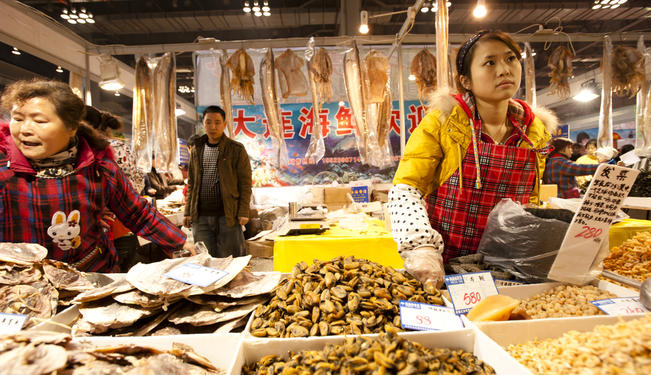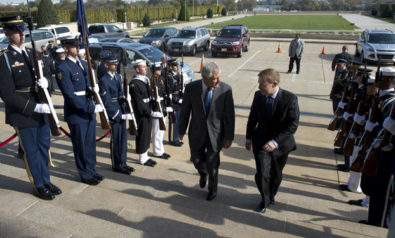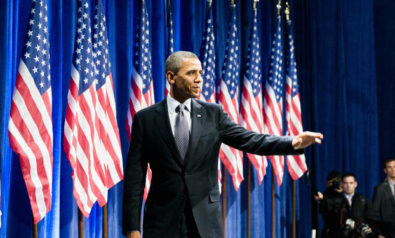China's "Marching West" strategy has gained international attention.
By Zhang Hongzhou
As the United States pivots toward the east, China has launched the so-called "Marching West" strategy to avoid a direct confrontation with the Americans — a strategy first articulated by a prominent Chinese scholar, Wang Jisi.
While much attention has been given to the strategic and diplomatic importance of countering the US pivot to Asia and on China's overseas quest for energy resources, food could be an important driver behind Beijing's Marching West strategy.
Diversifying From the US
For decades, self-sufficiency has been the cornerstone of China's food security strategy. Yet facing dual challenges of rapidly growing demand for food and fast-depleting water, land and labor resources, China has to import large quantities of food from other countries. As it relies more on foreign imports to feed itself, an overdependence on US imports, amid deep-seated Sino-US strategic distrust, is drawing serious concern.
To better safeguard the country's food security, China aims to diversify its food imports away from the US and build its own global food supply system by investing in overseas agricultural resources. To secure its food supplies, China is marching west, particularly to Russia, Central Asia and Europe, where food and agricultural resources abound.
Russia
In contrast to China, Russia, especially its Far East region, has wide swathes of unfarmed fertile land. As China faces increasing difficulties to produce enough food to feed its people, the Chinese government opened talks on investing in Russian farmland.
In 2012, China Investment Corporation contributed $1 billion to a joint Russian-Chinese fund to invest in agriculture and timber in Russia and other former Soviet states. Chinese firms, led by state-owned companies, have leased at least 600,000 hectares of land and 800,000 hectares of forests.
Central Asia
According to the Food and Agriculture Organization (FAO), Central Asia has vast untapped agricultural resources and a vital role in improving world food security. Yet it faces key obstacles in its farming techniques, inputs and agricultural machinery, along with transport infrastructure and storage facilities. This makes Central Asia an ideal target for China's agricultural going-out, particularly given the stable and close relations between China and Central Asian countries.
In 2012, Wen Jiabao announced that China would consider setting up a China-Central agricultural cooperation fund and building several trade zones and agricultural demonstration centers to promote agricultural development in the region. And in 2013, addressing a Shanghai Cooperation Organization (SCO) summit in Kyrgyzstan, Chinese leader Xi Jinping proposed that SCO countries should establish a cooperation mechanism for food security.
Two main Central Asian countries targeted by China are Tajikistan and Kazakhstan. In Tajikistan, China has leased or controlled over 100,000 hectares of land so far. Both countries are also discussing the possibility of establishing a free trade zone in neighboring countries to expand trade in agricultural products.
In Kazakhstan, Chinese companies have already had large presence in the country’s agricultural sector. It is reported that China's state-owned Jilin Grain Group invested in one project covering 1 million hectares of land in Kazakhstan for soybean production.
Also, two countries have taken serious efforts to facilitate cross-border agricultural trade.
In December 2013, China opened its first green channel for agricultural product, connecting its Bakty port and Kazakhstan’s Baktu port. The green channel, which is a significant part of the development of a Silk Road economic zone, helps China meet its growing demand for grains.
Europe
European countries are among the world's leading food exporters. As China looks to diversify its food imports away from the US to strengthen the country's food security, it is interested in expanding agricultural trade with Europe's leading food exporters, such as France, the Netherlands and Germany.
In 2012, China and the European Union (EU) signed the Agriculture Cooperation Plan, which aims to address issues, including food security and the environment, with a goal of expanding trade relations and sustainability.
At the 16th China-EU Summit in November 2013, a Letter of Intent on Research and Innovation Cooperation in Food, Agriculture and Biotechnology was signed between the EU and China, with the hope to enhance cooperation on food security and safety.
China also intends to cooperate with the EU at the multilateral level, notably on global food governance issues dealt with by the G20 and World Trade Organization (WTO), pushing forward the Doha round of negotiations. China and the EU will strive to get WTO members to reach agreement on agricultural trade facilitation.
Turning to Central and Eastern Europe
More prominently, China is turning to central and eastern European (CEE) countries for food. As Prime Minister Li Keqiang stated during his visit to CEE countries in November 2013, CEE nations produce high-quality meat, dairy and wine products and China's urbanization will unleash greater demands for beef, lamb, cheese, wine and other products.
Thus, China wishes to import more food products from CEE countries. Among the CEE countries, Ukraine is attracting huge interest from China. In 2012, China's Export and Import Bank agreed to provide a loan of $3 billion to Ukraine to develop its agriculture; in return, Ukraine will export corn to China.
In the same year, UkrLandFarming signed a memorandum of cooperation with China’s CAMC Engineering Co. for up to $4 billion in investment to build production facilities for an annual output of 400,000 tonnes of pork and 600,000 tonnes of chicken, as well as a grain terminal with handling capacity up to 5 million tonnes in Ukraine.
And in December 2013, during then-Ukrainian President Viktor Yanukovych's visit to China, the two countries tabled a five-year plan to deepen their strategic partnership, while their first priority area for expanding cooperation is agriculture.
Food is becoming a key factor shaping China's international strategies and foreign policy, in a way similar to, if not more profound than, energy.
*[Note: Zhang Hongzhou is an Associate Research Fellow with the China Programme at the S. Rajaratnam School of International Studies (RSIS), Nanyang Technological University. This article was originally published by RSIS.]
The views expressed in this article are the author's own and do not necessarily reflect Fair Observer’s editorial policy.
Image: Copyright © Shutterstock. All Rights Reserved
Support Fair Observer
We rely on your support for our independence, diversity and quality.
For more than 10 years, Fair Observer has been free, fair and independent. No billionaire owns us, no advertisers control us. We are a reader-supported nonprofit. Unlike many other publications, we keep our content free for readers regardless of where they live or whether they can afford to pay. We have no paywalls and no ads.
In the post-truth era of fake news, echo chambers and filter bubbles, we publish a plurality of perspectives from around the world. Anyone can publish with us, but everyone goes through a rigorous editorial process. So, you get fact-checked, well-reasoned content instead of noise.
We publish 2,500+ voices from 90+ countries. We also conduct education and training programs
on subjects ranging from digital media and journalism to writing and critical thinking. This
doesn’t come cheap. Servers, editors, trainers and web developers cost
money.
Please consider supporting us on a regular basis as a recurring donor or a
sustaining member.
Will you support FO’s journalism?
We rely on your support for our independence, diversity and quality.








Comment